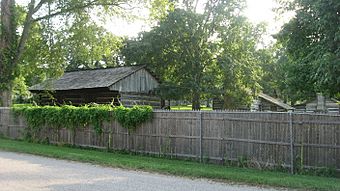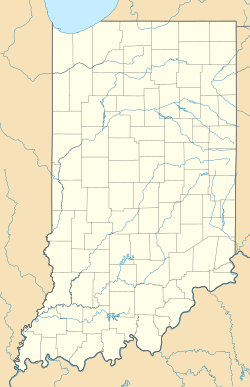Lincoln Pioneer Village facts for kids
Quick facts for kids |
|
|
Lincoln Pioneer Village
|
|

From 9th Street, in July 2011
|
|
| Location | Junction of 9th St. and Eureka Rd., Rockport, Indiana |
|---|---|
| Area | 1.8 acres (0.73 ha) |
| Built | 1935 |
| Built by | WPA/FERA |
| Architect | George Honig |
| Architectural style | Split log cabin |
| NRHP reference No. | 98000305 |
| Added to NRHP | April 20, 1998 |
The Lincoln Pioneer Village is a special place in Rockport, Indiana, right by the Ohio River. It's a memorial dedicated to Abraham Lincoln, who later became a famous president. Lincoln spent many of his childhood years living in this area.
This village was built a long time ago, between 1934 and 1935. It was created in the city park by a group called the Works Progress Administration (WPA). The WPA helped people find jobs during a tough time in history.
A talented artist named George Honig designed this village. He made sure it looked like a real pioneer settlement from Lincoln's time. The Spencer County Historical Society and the Rockport City Council helped make this project happen. On April 20, 1998, the village was added to the National Register of Historic Places. This means it's an important historical site worth protecting.
Contents
Exploring Lincoln's Early Life
Rockport is the main town in Spencer County. It is about 17 miles from where Abraham Lincoln grew up. When Lincoln was young, he would visit Rockport. He often borrowed books from John Pitcher, who was a lawyer there. Lincoln also started his flatboat trips to New Orleans from Rockport with his friend Allen Gentry.
What You'll See at the Village
The Lincoln Pioneer Village was built close to the boat landing Lincoln used. A wooden fence, called a stockade, surrounds the village. Inside, you'll find many replica buildings. These include a copy of the old Little Pigeon Baptist Church and a log cabin school house. There's also an inn, several houses, and even a law office.
The cabins in the village look like the homes of people who lived in the community where Lincoln was raised. This community was called the Little Pigeon Creek Community. Each cabin is decorated with items from the pioneer days. You can see spinning wheels, butter churns, handmade chairs, and iron pans. There are also tables, beds, dishes, and other furnishings that show how people lived back then.
Important Homes and Buildings
The village features replicas of homes belonging to people important in Lincoln's life. You can see the home of his sister, Sarah Lincoln Grigsby, and her husband, Aaron Grigsby. There's also the house of James Gentry, a merchant and farmer. Another home is that of Josiah Crawford, who employed both Abraham and Sarah Lincoln.
The Aunt Lepha Mackey Cabin is also part of the village. This cabin represents the home of a Rockport woman who taught African American children. At that time, these children might not have had a chance to go to school otherwise. Mackey's cabin was the site of the first school for African American children in southern Indiana. The village also includes a copy of John Pitcher's law office and the William Jones store.
Buildings in the Village
The Lincoln Pioneer Village has many different buildings. Each one helps tell the story of pioneer life and Abraham Lincoln's early years.
- Administration Building and Museum Room
- John Pitcher Law Office
- Azel Dorsey House
- Daniel Grass House
- Aunt Lepha Mackey House
- Gentry Mansion
- Former Home of Rueben Grigsby
- Pigeon Creek Baptist Church
- Brown's Inn
- Lincoln Cabin
- Market and Barter House
- Grandview Blockhouse
- Mr. and Mrs. Josiah Crawford House
- William Jones store
See Also
- Lincoln Boyhood National Memorial
- Lincoln State Park, a state park with buildings from the Little Pigeon Creek Community
- Little Pigeon Creek Community, the place where the Lincoln family lived from 1816 to 1830
 | Delilah Pierce |
 | Gordon Parks |
 | Augusta Savage |
 | Charles Ethan Porter |


